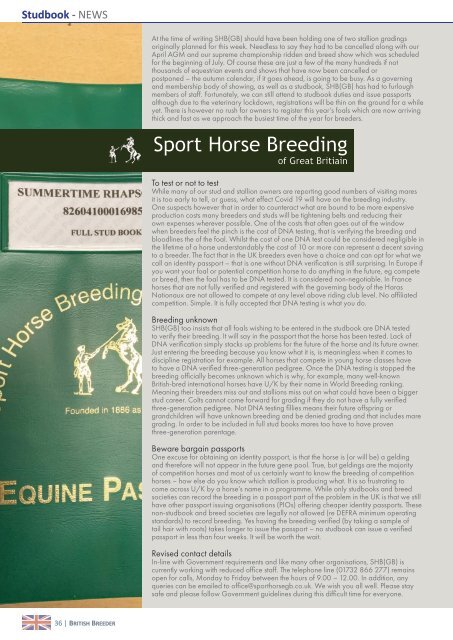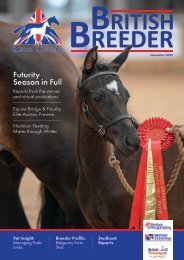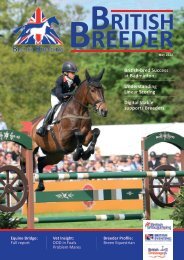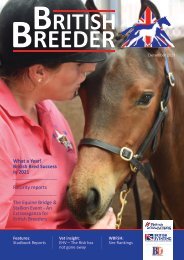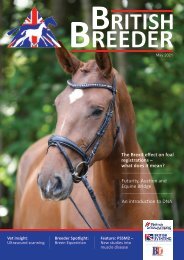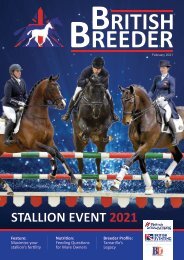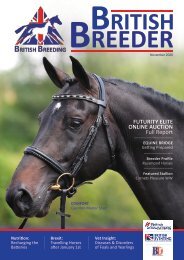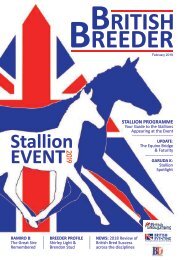British Breeder Magazine May 2020
Magazine for breeders of British bred sport horses. Includes breeding industry news, updates, interviews, profiles and reports.
Magazine for breeders of British bred sport horses. Includes breeding industry news, updates, interviews, profiles and reports.
Create successful ePaper yourself
Turn your PDF publications into a flip-book with our unique Google optimized e-Paper software.
Studbook - NEWS<br />
At the time of writing SHB(GB) should have been holding one of two stallion gradings<br />
originally planned for this week. Needless to say they had to be cancelled along with our<br />
April AGM and our supreme championship ridden and breed show which was scheduled<br />
for the beginning of July. Of course these are just a few of the many hundreds if not<br />
thousands of equestrian events and shows that have now been cancelled or<br />
postponed – the autumn calendar, if it goes ahead, is going to be busy. As a governing<br />
and membership body of showing, as well as a studbook, SHB(GB) has had to furlough<br />
members of staff. Fortunately, we can still attend to studbook duties and issue passports<br />
although due to the veterinary lockdown, registrations will be thin on the ground for a while<br />
yet. There is however no rush for owners to register this year’s foals which are now arriving<br />
thick and fast as we approach the busiest time of the year for breeders.<br />
Sport Horse Breeding<br />
of Great Britiain<br />
To test or not to test<br />
While many of our stud and stallion owners are reporting good numbers of visiting mares<br />
it is too early to tell, or guess, what effect Covid 19 will have on the breeding industry.<br />
One suspects however that in order to counteract what are bound to be more expensive<br />
production costs many breeders and studs will be tightening belts and reducing their<br />
own expenses wherever possible. One of the costs that often goes out of the window<br />
when breeders feel the pinch is the cost of DNA testing, that is verifying the breeding and<br />
bloodlines the of the foal. Whilst the cost of one DNA test could be considered negligible in<br />
the lifetime of a horse understandably the cost of 10 or more can represent a decent saving<br />
to a breeder. The fact that in the UK breeders even have a choice and can opt for what we<br />
call an identity passport – that is one without DNA verification is still surprising. In Europe if<br />
you want your foal or potential competition horse to do anything in the future, eg compete<br />
or breed, then the foal has to be DNA tested. It is considered non-negotiable. In France<br />
horses that are not fully verified and registered with the governing body of the Haras<br />
Nationaux are not allowed to compete at any level above riding club level. No affiliated<br />
competition. Simple. It is fully accepted that DNA testing is what you do.<br />
Breeding unknown<br />
SHB(GB) too insists that all foals wishing to be entered in the studbook are DNA tested<br />
to verify their breeding. It will say in the passport that the horse has been tested. Lack of<br />
DNA verification simply stacks up problems for the future of the horse and its future owner.<br />
Just entering the breeding because you know what it is, is meaningless when it comes to<br />
discipline registration for example. All horses that compete in young horse classes have<br />
to have a DNA verified three-generation pedigree. Once the DNA testing is stopped the<br />
breeding officially becomes unknown which is why, for example, many well-known<br />
<strong>British</strong>-bred international horses have U/K by their name in World Breeding ranking.<br />
Meaning their breeders miss out and stallions miss out on what could have been a bigger<br />
stud career. Colts cannot come forward for grading if they do not have a fully verified<br />
three-generation pedigree. Not DNA testing fillies means their future offspring or<br />
grandchildren will have unknown breeding and be denied grading and that includes mare<br />
grading. In order to be included in full stud books mares too have to have proven<br />
three-generation parentage.<br />
Beware bargain passports<br />
One excuse for obtaining an identity passport, is that the horse is (or will be) a gelding<br />
and therefore will not appear in the future gene pool. True, but geldings are the majority<br />
of competition horses and most of us certainly want to know the breeding of competition<br />
horses – how else do you know which stallion is producing what. It is so frustrating to<br />
come across U/K by a horse’s name in a programme. While only studbooks and breed<br />
societies can record the breeding in a passport part of the problem in the UK is that we still<br />
have other passport issuing organisations (PIOs) offering cheaper identity passports. These<br />
non-studbook and breed societies are legally not allowed (re DEFRA minimum operating<br />
standards) to record breeding. Yes having the breeding verified (by taking a sample of<br />
tail hair with roots) takes longer to issue the passport – no studbook can issue a verified<br />
passport in less than four weeks. It will be worth the wait.<br />
Revised contact details<br />
In-line with Government requirements and like many other organisations, SHB(GB) is<br />
currently working with reduced office staff. The telephone line (01732 866 277) remains<br />
open for calls, Monday to Friday between the hours of 9.00 – 12.00. In addition, any<br />
queries can be emailed to office@sporthorsegb.co.uk. We wish you all well. Please stay<br />
safe and please follow Government guidelines during this difficult time for everyone.<br />
36 | BRITISH BREEDER


